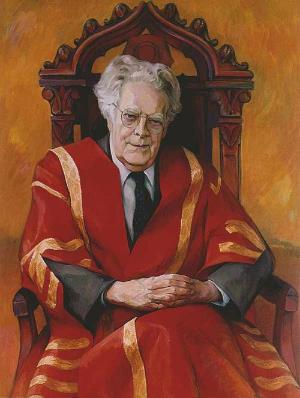
Northrop Frye
by Todd Lawson, University of Toronto, Dept. of Near and Middle Eastern Civilizations
In the course of my ongoing research project, studying the Qur’an as a special instance of apocalyptic discourse, I have found that the writings of Northrop Frye hold important clues and suggestions for both the apocalyptic élan of the Qur’an and the related problem of the Qur’an’s status as a specific form of epic. The two seem to go together and I am exploring these cross-pollinating and mutually energizing literary dynamics in the book that will result. In the meantime, I have found that Frye deserves to be mined more deeply for what is obviously his irresistible interest in the Qur’an.
Over the last two years, I have conducted a grad seminar at the University of Toronto entitled “The Quran and the Apocalyptic Imagination.†A large part of the discussion in this course has focussed on Frye and what he might have to say about the Quran. I have also conducted an undergraduate seminar “How Does the Qur’an Mean” in which two texts have been assigned: the Qur’an and Frye’s Double Vision. It has been a revelation. In part, this has been an attempt to have a conversation that I never had the nerve to initiate while the great man was alive and working away happily, virtually across the street. In any case, the results have been extremely encouraging. I am now delving deep into the Frye archive and studying his marginalia and other related documents.
Frye’s explicit references to Islam and the Qur’an, though few, have long been in print. I am calling for a workshop to see if we can manage a coherent discussion around this general theme. The Frye Centenary seemed an excellent place for such a thing, especially since it gives people who have flirted with the idea already plenty of time to prepare something. I am afraid there is no funding available from me (at least at the moment) or, as far as I know, anyone else. But Toronto in early October can be a pleasant place. A number of topics immediately present themselves and I am sure there are many more. Some are summarized in this recent abstract I submitted to another conference:
Northrop Frye, one of the preeminent literary critics of the second half of the 20th century, changed the way the world thought about literature, primarily with his Anatomy of Criticism, but also in many other books and essays. In his later years, he turned almost his full attention to scripture, primarily the Bible, on which he wrote two important books and a third smaller summary. In all three, the insights he developed gave a new understanding of the coherence and integrity of the Bible in which the workings of biblical typological figuration , time, narrative and apocalypse combined to form a coherent whole. In these works he also made scattered and frequently very perceptive remarks about the Qur’an, its form and contents. Research into his private papers and archives at the University of Toronto, where he taught all his life, reveals that his relationship with Qur’an started long before his published study of the Bible. This paper will discuss this relationship, his various critical views on the Qur’an and offer a summary assessment for future research.
• Community as a primary concern in the Frygian Koran
• Koran as Epic and Apocalypse
• The Koran’s Fearful Symmetry
• Time, Typology, Revolution and Narrative in the Koran
• Frye’s Islam: Contradictions and Insights